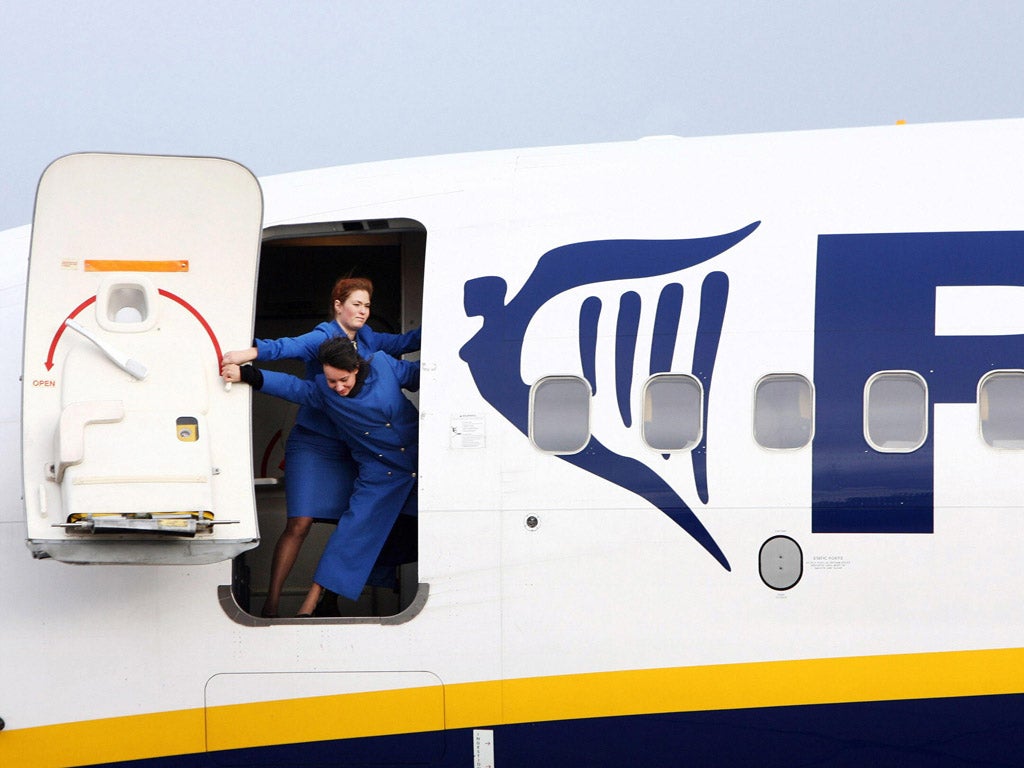Amid competition from the likes of Asda, Ryanair's Cabin Crew Calendar is sexploitation at its worst
Our campaigner says that implicit within the low-cost carrier's vile campaign is the invitation to ogle at airline staff. And we're not talking about the men here, are we?


This week has seen weary consumers bombarded with another annual crop of Christmas adverts peddling tired, outdated stereotypes. From the Asda ad showing mothers taking sole responsibility for every conceivable domestic duty while Dad lounges ungratefully in front of the TV to Morrisons’ suggestion that if Mum doesn’t feel stressed, oppressed and generally utterly wretched then it isn’t really Christmas at all.
But as unhelpful as these adverts are (with their 1950s gender stereotypes insidiously pumping into living rooms and children’s developing world views), on the scale of offensive, harmful exploitation they are not in the same league as the Ryanair cabin crew calendar and its associated “Red Hot Fares and Crew” campaign.
The ads, featured on the front page of Ryanair’s website, feature an image of a cabin crew member in a bikini, and explicitly suggest that the “red hot” crew are part of the reason holidaymakers should book, whilst implicitly suggesting that customers are purchasing the right to ogle airline staff as part of their ticket price.
Ryanair was forced to withdraw near-identical adverts only nine months ago, after the Advertising Standards Agency (ASA) ruled against them, noting: “most readers would interpret these images… as linking female cabin crew with sexually suggestive behaviour.” But apparently the risk of inciting sexual harassment against members of staff isn’t a huge concern at Ryanair HQ, as the company went right ahead with commissioning this year’s calendar, featuring only female cabin crew, and using it to advertise fares in exactly the same exploitative manner.
The company’s response to the ASA claimed: “Because members of their cabin crew volunteered their time to produce and promote the calendar, it was not sexist and could not be seen to objectify the women who appeared in it.”
Irresponsible
But it made no effort to address the fact that it was all female cabin crew who were implicitly referenced in the “Red Hot Fares and Crew” campaign, and subsequently all female employees who might expect to face higher levels of sexual harassment in flight as a result – not just those who had chosen to appear in the calendar.
The Advertising Standards Authority for Ireland also upheld complaints about the “Red Hot Fares and Crew” advert when it appeared on the Ryanair website in February this year. When I rang to enquire about the re-emergence of the adverts, a spokesperson told me: “Ryanair are not co-operating with us at the moment. We have a compliance programme and have written to them this week pointing out that there is an existing judgement on a very similar advert and that this is not in compliance with that existing decision and with the advertising code.”
The Flight Attendant’s Association of Australia has warned against such provocative advertising, saying that it could put cabin crew at risk of sexual harassment and abuse. UK union Unite is currently running a survey to assess levels of sexual harassment suffered by cabin crew due to its concern about the “increasing tendency to use sexual imagery, and messages in advertising to sell flights, which give the wrong impression of cabin crew,” and “could lead to an increase in sexual harassment.”
One entry to the Everyday Sexism Project reports the experience of a female cabin crew member who “was asked by a male in business class to do up his flies for him. Amazingly she did for fear of getting into trouble for not looking after the passengers”.
In an industry where close proximity to passengers and an unusual, often emotionally heightened environment might already put employees at higher risk of sexual harassment, it is deeply irresponsible for companies actively to encourage passengers to see crew members in a sexualised manner. Relationship psychologist Susan Quilliam says: “once you’re in the airport system, you are more likely to cross those barriers.
There are anecdotal reports of perpetrators saying: ‘I don’t know what came over me’ or ‘I never would have done that normally.’” She says adverts that present cabin crew in a sexualised manner send the message that “employers see them as fair game;” not only giving passengers a sense of “permission” to harass them, but also suggesting to victims themselves that they should simply “get on with it”. Quilliam adds that there is “an existing cultural prejudice about cabin crew being sexually available” and that adverts which show sexualised images of airline employees “perpetuate and exacerbate” the problem.
Exploitation
Ryanair is not alone in peddling the stereotype – a series of Virgin Atlantic adverts has featured predominantly female cabin crew in red stilettos and figure-fitting red uniforms with close-up leg shots and long hair blowing in the wind either dancing or causing male passengers to stop in their tracks. A typical tagline reads “Still red hot after 25 years.”
Similar adverts featuring beautiful female cabin crew in model-like videos are replicated across airlines worldwide, whilst captains and pilots are almost exclusively portrayed as male. One Russian airline, Avianova, even produced an advert featuring female cabin crew stripping down to bikinis to wash the plane.
It is an industry in which sexism still seems to reign supreme - airlines have minimum make-up requirements for female staff and high heels are often compulsory, despite the main job of cabin crew being to ensure the safety and wellbeing of passengers. To look smart and presentable at work is one thing, but for female staff to be explicitly required to wear specific shades of lipstick and flog bikini cabin crew calendars in-flight is quite another.
Attending a Ryanair assessment and interview day for cabin crew earlier this year in the wake of the advertising furore, I politely asked the interviewer whether she thought cabin crew might suffer unwanted advances or passenger attention as a result of selling the titillating calendars in-flight. The angry response, repeated several times, was simply “I don’t know what you’re getting at… it’s a charity calendar. It’s a charity calendar”. Needless to say, a letter of rejection swiftly followed.
In a profession where employees might be considered to be at particular risk of harassment, instead of seeing employers attempt to minimize the risks, we are seeing them exploit their workers by capitalising on sexual objectification instead. Such practices might cause an outcry if employed in another industry, yet here normalisation has allowed them to continue. Normalisation, and Ryanair’s apparent utter disregard for the wellbeing of its female staff.

Join our commenting forum
Join thought-provoking conversations, follow other Independent readers and see their replies